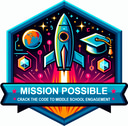Science
1. Hands-On Learning:
Science Experiments: Use hands-on experiments to help students understand scientific concepts. For example, when studying chemical reactions, students can perform simple experiments like vinegar and baking soda reactions to visualize and understand acids and bases in action.
Building Models: Students can create physical models of systems they study, such as a solar system, cell structure, or molecular compounds. This engages students by letting them build and manipulate the concepts they're learning.
Fieldwork and Observations: Take students on nature walks or trips to local science centers to observe ecosystems, plant life, or geological formations. They can document their findings in field journals, adding a tactile, real-world aspect to their science lessons.
2. More Videos or Self-Paced Learning:
Interactive Science Videos: Show educational science videos that break down complex topics with visual aids. Platforms like YouTube or educational websites like Khan Academy have engaging videos on everything from physics to biology that help students grasp abstract concepts.
Flipped Classroom Videos: Have students watch instructional videos at home on specific science topics (e.g., the water cycle or Newton’s laws). Then, during class time, students can engage in hands-on activities or discussions that apply what they learned from the videos.
Digital Lab Simulations: Use online science simulations (e.g., PhET Interactive Simulations) to allow students to explore and experiment virtually with different science concepts like electricity, force, or genetics at their own pace. These self-paced platforms let students experiment and learn without the constraints of physical materials.
3. Wordle for Science:
Wordle with Scientific Terms: Create a version of Wordle using science vocabulary. For example, students could guess terms related to a unit (e.g., "photosynthesis," "elements," "atoms"). This helps reinforce key concepts while playing a fun and familiar word game.
Wordle Challenges Based on Units: Each day, challenge students with a Wordle puzzle based on words related to the unit they're studying. For instance, during a chemistry unit, students could guess terms like "molecule," "ion," or "compound."
Vocabulary Review: At the end of a lesson or week, host a science-themed Wordle game as a quick vocabulary review. Students can collaborate in small groups to guess words related to the concepts they've learned, making vocabulary revision more engaging.
By blending hands-on activities, multimedia resources, and fun games like Wordle, science teachers can foster a dynamic and interactive learning environment that keeps students engaged while deepening their understanding of science.
